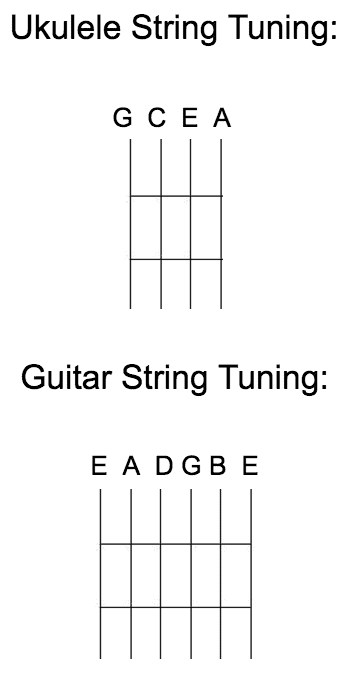Ukulele or guitar? Which one is right for you? This article explores the unique characteristics of each instrument to help you choose the one that suits your musical goals.
What Is The Difference Between A Ukulele and A Guitar?
The ukulele and guitar are both stringed instruments, but the difference is in their size, shape, strings, and how they are played.
The ukulele typically contains four nylon or gut strings and is smaller than a guitar with a body often made of one large piece of wood.
The frets on the ukulele are also closer together than on a guitar, which makes it easier to play.
Regarding the sound, the ukulele produces a much brighter tone than the guitar. It is usually strummed using your fingers while the guitar can be played with picks or fingers.
Ukulele vs Guitar: Tuning
Ukuleles and guitars have important differences, especially concerning their tunings. Ukuleles are tuned G-C-E-A, while guitars are tuned E-A-D-G-B-E.

While the tuning method is similar for both instruments, the sound produced differs as the shapes of chords can also be different, with a D chord on the guitar being equivalent to a G chord on the ukulele.
Additionally, bass ukuleles are tuned in a similar fashion to standard guitars (D-G-B-E) but have lower tension than both guitars and regular ukuleles.
Ukulele vs Guitar: Which is Easier to Learn?
The Ukulele and Guitar are two popular stringed instruments, but which is easier to learn?
Both instruments require a certain amount of patience and skill, however, the Ukulele has some advantages that make it an easier instrument for beginners.
For one thing, the ukulele is much smaller than a guitar, meaning it’s easier to manage both physically and mentally.
Additionally, the strings on a Ukulele require less tension than those of a guitar, making them gentler on fingers and allowing for greater accuracy when playing chords.
Furthermore, many beginners find it easier to remember chord shapes using a ukulele because of its four-string configuration rather than six-string like a guitar.
Ultimately though, which instrument you choose will come down to personal preference.
If you’re comfortable with larger instruments then the guitar may be your best bet, whereas if you’re looking for something with more convenience then the ukulele could be perfect!
Ukulele vs Guitar: Which is Best For You?
When it comes to musical instruments, deciding between a ukulele and a guitar can be difficult.
Both the ukulele and guitar are popular string instruments, though they vary in style, sound, and playing method.
The ukulele is much smaller than the guitar, with four strings instead of six, making it easier to play for those with smaller hands.
Its bright-sounding resonance gives off a lighthearted sound, perfect for accompanying genres such as reggae and folk music.
Guitars however have a much fuller sound with more tonal variation due to their larger size and additional strings. They are ideal for styles like rock and pop music that require heavier sound production.
Ultimately the decision is yours; if you’re looking for something small, easy-to-learn, and airy then go for the ukulele; otherwise pick up a guitar!
Why Does Ukulele Sound Higher Than Guitar?
The ukulele has a high-pitched sound compared to the guitar due to its small size.
It is made up of four strings that are tuned higher than a guitar’s six strings, creating a unique, bright tone that differs from the deeper sounds of the guitar.
Additionally, because of its smaller body and shorter strings, the ukulele produces notes more quickly and has less string tension compared to a guitar, resulting in a much lighter sound.
The ukulele’s tone is often described as fun and uplifting which makes it an ideal instrument for playing cheerful music such as Hawaiian songs or pop music.
Is It Better To Play The Guitar or Ukulele?
It depends on personal preference and the type of music you want to play.
The guitar is a versatile instrument with a wide range of techniques that can be used, while the ukulele is simpler and easier to learn, making it suitable for beginners.
The guitar typically has a larger neck which allows for easier access to frets than the ukulele, but this also means that it is heavier and harder to hold for long periods of time while playing.
On the other hand, ukuleles are lightweight and portable, making them great for taking along on trips or playing in smaller settings.
In terms of sound, each instrument has its own unique tone that suits different types of music, from rock ‘n’ roll on the guitar to island-inspired tunes on the ukulele.
In short, it comes down to what sounds best for you, let’s experiment and find out!
What Are The Disadvantages of the Ukulele?
The Ukulele has several disadvantages, such as its size. Due to its small body and short neck, some complex chords that can be played on a guitar cannot be produced on a ukulele.
Also, the size of the strings and lack of tension can make it difficult for some players to express their musicality because of this, barre chords and finger-picking styles are more difficult to master than with other instruments.
Additionally, due to its low-volume acoustic sound, amplification is necessary if playing in a larger venue or with other instruments.
Lastly, ukuleles may require frequent tuning during performances due to their construction materials and design, even then they do not always stay in tune long enough for extended playing time.
Should My Child Learn Guitar or Ukulele?
It is up to you and your child to decide whether they should learn guitar or ukulele. Both instruments offer an enjoyable way to learn music, as well as being extremely versatile.
The guitar is usually slightly easier to learn as its fretboard is larger, but the ukulele can produce a unique sound that many people enjoy.
It comes down to your child’s preference, think about what kind of music they like, the types of songs they’d like to play, and the size of instrument they would be comfortable playing.
What Age Is Best To Learn Guitar?
The best age to learn guitar will vary from person to person, as each individual learns differently.
Generally speaking though, starting to learn guitar at a young age is beneficial as it gives children the opportunity to develop their fine motor skills, hand-eye coordination, and overall musical ability.
Starting from around 7 years old is ideal, as this allows enough time for basic concepts like chords and scales to be taught and mastered.
Beginning any later than 13 can make learning more difficult by that point, however, with dedication and practice it’s still possible.
In short, no matter what age you start playing guitar at there are countless benefits that come along with it!
What Is A Good Age To Start Ukulele?
The best age to start playing the ukulele depends on the individual.
For younger children, starting as young as four or five is perfectly reasonable. It’s also never too late to start playing.
Many people begin learning the ukulele in their teenage years or even later in life!
The important thing is ensuring that the student has a good foundation of hand-eye coordination and basic rhythm, so it’s important to choose an instructor who understands how to best teach those skills.
Are Ukuleles Cheaper Than Guitars?
Yes. Ukuleles are generally cheaper than guitars as they are smaller and simpler in design.
Moreover, the range of materials used to make ukuleles, such as plastic, wood, or composite materials can make them more cost-effective.
Since their popularity has grown in recent years, many brands have come out with more affordable models that can be obtained for much lower prices than decent guitars.
Consequently, those looking for a musical instrument on a budget may find that a ukulele is the better choice compared to a guitar.
Conclusion
In conclusion, both the ukulele and guitar are versatile instruments that offer a unique sound. However, the ukulele is more popular for its small size and portability.
Its four strings make it easier to learn than the six-stringed guitar, while its tone offers a softer, brighter sound.
Ultimately, players should choose an instrument based on the type of music they want to create and their own level of skill.


